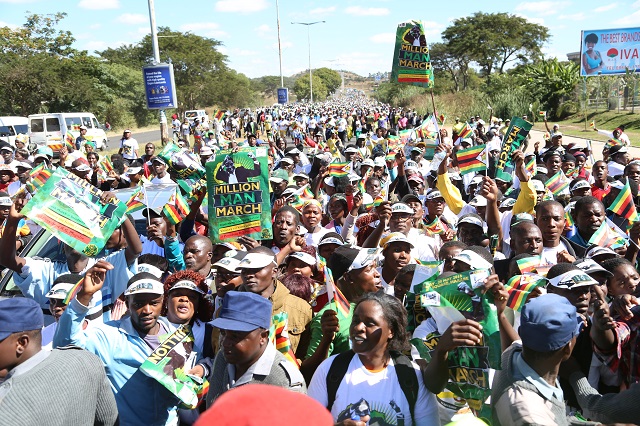Youth take up national development process

Saul Gwakuba Ndlovu
THE recent “one million-man match” organised by the Zanu-PF youth wing and held in Harare on May 25 showed how important young activists are to the national development process.
The Harare event was of a political character as its primary aim was to show practically Zimbabwe’s numeral support for President Robert Mugabe.
Zanu-F’s youth wing was credited for the large number of people who turned up for the historic occasion.
The purpose of this article is not to focus on that event as that has already been adequately done by several commentators.
This article’s aim is to highlight what role the demographic section referred to as “the youth” can play in national economic, political, social and cultural development.
It is generally accepted that those aged between 18 and 35 years comprise “the youth”. This differs, however, from culture to culture as some communities regard the minimum age of the youth to be about 13 or 14, and the maximum to be about 33 years.
This last view agrees with the modern sociologist’s assertion that every generation has its youths and a generation is a period ranging from 13 to 33 years (20-years). That, incidentally, is the length of the period Jesus Christ lived on earth.
However, these lowest and highest cut-off ages are not important at all in this discussion as what we are looking at is the part the “youths” can and should play to make their respective countries better than they were when they first became youths.
Youths have the physical vigour, the mental enthusiasm, the psychological valour to create ideas, organisations, products, services, adventure and excitement.
What they lack is knowledge and experience, hence the unquestionable need to educate and guide them.
Having acquired education, they can use the trial and error method to influence national social and cultural processes and to invent, modify, add value to natural resources and national products and various services.
Using their physical energy, youths can and should augment family food stocks, create and improve the infrastructure of their respective communities, generate and increase countries’ wealth.
That means, in effect, through their zeal and sweat, youths can and should create sources of material comforts such as accommodation and clothing as they comprise the bulk of employable people in both the formal and informal sectors.
In education, the youth’s abound, a social phenomenon that rises more or less pro rata to national population rates of increase.
Various nations expect social economic, cultural and political improvement in their people’s lives with the increase of the number of educated youths.
That is an important fact youths should always remember. In addition, the quality and quantity of education should also increase and improve in the people’s lives with the increase of the number of educated youths.
Also, the quality and quantity of education should also increase and improve as youths research and discover useful and usable natural phenomena, minerals, chemicals and whatever else that is positively helpful to human existence.
With climate change and desertification threatening the world, youths should grow trees and study dendrology as one of the world’s possible survival factors.
Dendrologists scientifically study the growing of trees, their diseases, their usefulness to the human race and other creatures, and how best to preserve them.
As some nations are still trying to find and adopt the best political and governance systems for their various communities, youths can and should play a major role by carrying out psychological researches in those varied socio-cultural environments as part of their political science studies.
It is indeed the duty of the youths to make well planned and detailed investigations about whether or not patriotism is synonymous with political loyalty, and if so why and how.
In their acquisition of education, youths should add to and improve through research the quality of our education, and in that way play a double role, by being students by learning, and tutors by research.
Youth have a very important role to play in Zimbabwe’s struggle against ignorance, disease and hunger, as vital a role as that played by the Salisbury City Youth League of James Robert Dambaza Chikerema and George “Bonzo” Nyandoro.
That organisation, founded in 1953, freed a large number of people from the fear of the oppressive personnel, institutions, laws, policies and practices of the Southern Rhodesia white minority regime.
Today’s youths have the responsibility to free the people from ignorance about how to use the land productively, how to prevent or cure diseases such as cholera, malaria, bilharzia, various eye and ear ailments as well as those of the sexual and urinary tract.
It is the educated youths who should teach the population at large that wealth is generated and acquired through proper planning and hard work, coupled with wise investment policy, and certainly not by any kind of charms, let alone by killing other people including albinos and using their flesh in any way whatsoever.
The role of the youths did not end with the country’s emancipation on April 18, 1980, but continues as they struggle against poverty, the alleviation of which can never be achieved without the active participation of most of them.
The future of any nation is in practical terms in the hands of the youths. The past belongs, of course, to the older generation.
This means that it is the duty of the youths to strive to lay the future’s economic, cultural and social foundations today, in more or less the same way that teams of various sports disciplines prepare for the future by investing in their youths.
Two very vital things Zimbabwe’s youths must avoid, and do so whole heartedly, are drug consumption and sexual promiscuity.
It was extremely saddening to read in one of the national newspapers recently that 47 per cent of the University of Zimbabwe students who went for voluntary HIV testing recently tested positive.
Although that frightening statistic was later denied by the UZ authorities, one cannot avoid suspecting that there is something wrong with the sexual morals of a certain section of that institution’s student population.
Those students need to conduct some very thorough introspection with the aim to turn over an entirely new sexual moral leaf.
Low sexual morality is a very destructive socio-cultural weakness in any nation irrespective of whether it occurs in schools, churches, pubs, or families.
We now look at the youths’ cultural role, a rather wide field we cannot adequately cover in a seminal article of this size.
A people’s culture is practically expressed through their mode of worship (religion), their food and beverages (culinary culture), their methods of tilling their land, of harvesting and storing their crops (agriculture), their entertainment which includes songs, poetry, dances and story-telling (performing art as part of culture) and food collection plus snaring, fishing and hunting.
Zimbabwe’s youth in urban centres are exposed to a variety of cultural events that range from Christian services to traditional performances such as some of those that feature at some wedding occasions.
Whatever event, it is the youths that act as either presenters, performers or as part of the spectators or audiences.
New trends are replacing old ones in a large number of cultural performances. That is as it should be because culture is dynamic and not static.
That is particularly the case with entertainment and modes of worship.
The youths of Zimbabwe are quickly adapting to today’s global cultural village.
It would greatly serve Zimbabwe’s cultural heritage if the youths of each district came together as cultural groups under the traditional chief’s auspices.
Each group could then organise some cultural activities, leading to inter-district cultural contests, then to a national competition at province level.
Sponsorship could almost certainly be canvassed for at, first, district, then at provincial level. With the moral support of the chiefs, that can be done.
However, the ball is in the youths’ court. If they seized the proposal and launched the idea, each district could create a cultural legacy for the benefit of the entire nation.
Saul Gwakuba Ndlovu is a retired, Bulawayo – based journalist. He can be contacted on cell 0734 328 136 or through email. [email protected]










Comments